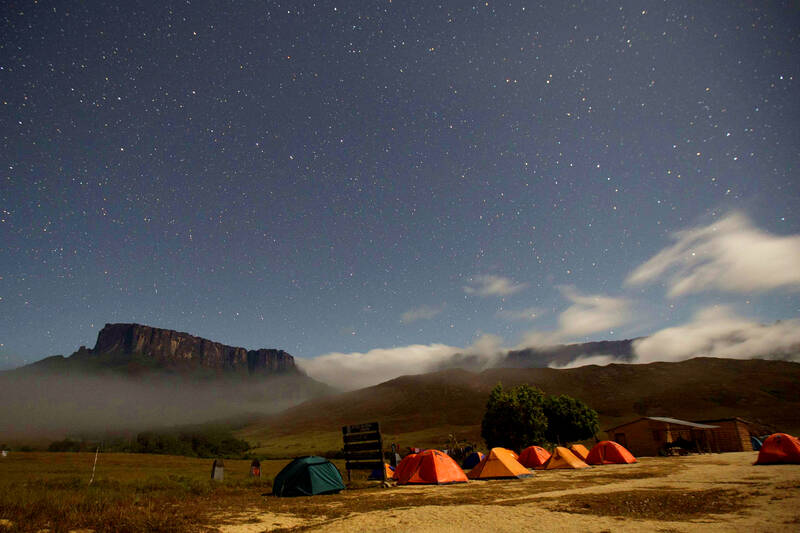Administrators at most destinations yearn to have them go viral on TikTok, or dream of attracting droves of Netflix Inc viewers, despite the risk of overwhelming communities. A small island off the southeastern coast of Finland is taking the opposite approach.
Tourism officials for Ulko-Tammio, one of several islands inside Eastern Gulf of Finland National Park, say they want it to be a “phone-free island” and are urging visitors to “switch off their smart devices and to stop and genuinely enjoy the islands,” said Mats Selin, an expert with Visit Kotka-Hamina, in a release.
The sentiment is echoed by Parks & Wildlife Finland, which manages the island’s pristine environment and wildlife.

Photo: Reuters
“We encourage visitors to put their phones away voluntarily and to focus their senses on nature rather than on their phones,” said outdoor recreation and visitor manager Joel Heino, in a statement.
On the travel side, booking a digital-free vacation in a tropical locale is a growing trend that even corporate executives are resorting to, and digital detox retreat options have long existed for those choosing to pull their noses out of phones on trips. But it’s not the norm for an industry that relies on influencers and breathtaking visuals on social media to attract visitors or convey a sense of place.
To wit: Some 63 percent of millennials and younger travelers say they’ve used at least one social media platform to plan trips in the past 12 months, according to a sentiment survey of American travelers last month from Destination Analysts. Besides, does your vacation really happen if you don’t post about all the fun you’re having there?
Attempts to get consumers to ditch their phones have increased over the years, particularly in the entertainment business.
Electronic dance music artist Lane 8 is famous for his phone-free concerts, and it’s brought bigger crowds for his live shows. Dave Chappelle and Alicia Keys were among the earliest adopters to ban phones at performances through use of the Yondr pouch, dating back to 2015: Pop your iPhone in a gray and lime-green pouch that seals as soon as you close it; you can carry it around, but you won’t be able to snap it open until you reach an unlocking station as you exit the event.
San Francisco-based Yondr’s locking phone cases are now used in select courthouses, theaters, restaurants and schools in the US that are looking to limit the use of devices.
In January, Thermae Bath Spa, located in historic Bath, England, announced it was becoming a mobile-free zone and would partner with Yondr. The public thermal day spa noted in a release that phones were “a regular source of annoyance” to guests, as well as “a problem for our staff who have to recover dropped phones from the bottom of pools.”
Yondr’s last public data release cited an estimated 1 million customers using its pouches in March last year; the company said it was unable to share more recent data. Questions as to whether the pouch’s effectiveness arose after it was used for the Broadway show Take Me Out, and leaked footage and images of a naked Jesse Williams on stage nonetheless appeared on social media.
There will be no Yondr pouches on Finland’s Ulko-Tammio island. But amid growing proof that social media is addictive and can impair mental health, perhaps more travelers are ready to ditch their phones in the great outdoors. It’s nice to think that a nudge will suffice.
If not, you can use a digital camera to get great photos, though you won’t be able to post them while on the island.

Many people noticed the flood of pro-China propaganda across a number of venues in recent weeks that looks like a coordinated assault on US Taiwan policy. It does look like an effort intended to influence the US before the meeting between US President Donald Trump and Chinese dictator Xi Jinping (習近平) over the weekend. Jennifer Kavanagh’s piece in the New York Times in September appears to be the opening strike of the current campaign. She followed up last week in the Lowy Interpreter, blaming the US for causing the PRC to escalate in the Philippines and Taiwan, saying that as

US President Donald Trump may have hoped for an impromptu talk with his old friend Kim Jong-un during a recent trip to Asia, but analysts say the increasingly emboldened North Korean despot had few good reasons to join the photo-op. Trump sent repeated overtures to Kim during his barnstorming tour of Asia, saying he was “100 percent” open to a meeting and even bucking decades of US policy by conceding that North Korea was “sort of a nuclear power.” But Pyongyang kept mum on the invitation, instead firing off missiles and sending its foreign minister to Russia and Belarus, with whom it

The Chinese Communist Party (CCP) has a dystopian, radical and dangerous conception of itself. Few are aware of this very fundamental difference between how they view power and how the rest of the world does. Even those of us who have lived in China sometimes fall back into the trap of viewing it through the lens of the power relationships common throughout the rest of the world, instead of understanding the CCP as it conceives of itself. Broadly speaking, the concepts of the people, race, culture, civilization, nation, government and religion are separate, though often overlapping and intertwined. A government

Nov. 3 to Nov. 9 In 1925, 18-year-old Huang Chin-chuan (黃金川) penned the following words: “When will the day of women’s equal rights arrive, so that my talents won’t drift away in the eastern stream?” These were the closing lines to her poem “Female Student” (女學生), which expressed her unwillingness to be confined to traditional female roles and her desire to study and explore the world. Born to a wealthy family on Nov. 5, 1907, Huang was able to study in Japan — a rare privilege for women in her time — and even made a name for herself in the